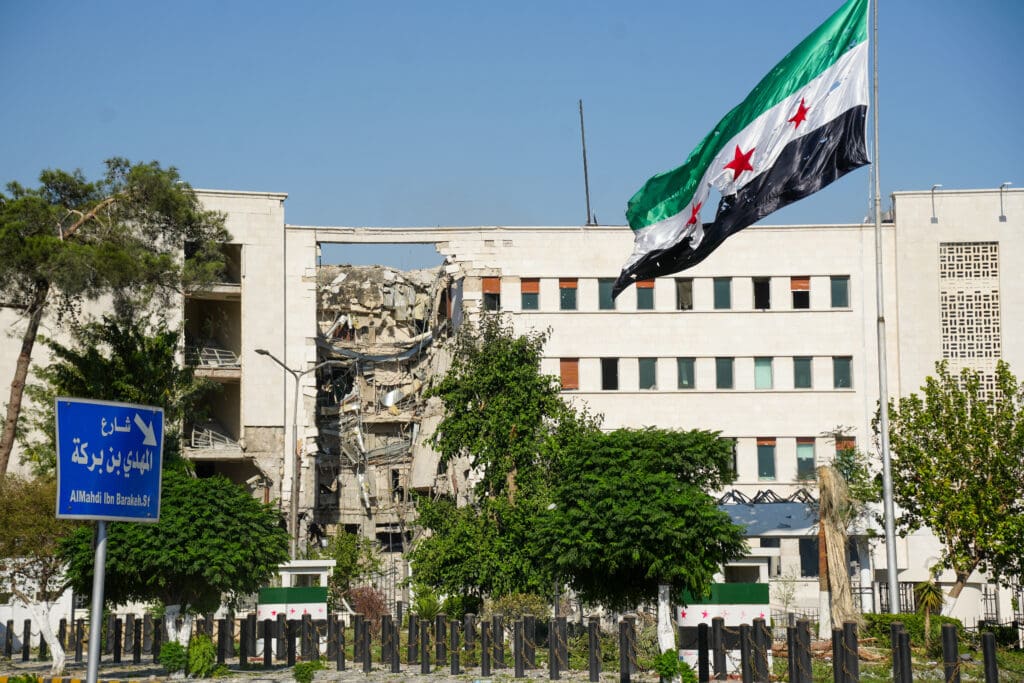On July 16, the Israeli army launched a massive air strike against the Syrian Defense Ministry, killing at least three people. The strike represents a dramatic escalation against key institutions of a sovereign state, following two days in which the Israeli army targeted Syrian military convoys moving south. While Israel claims that the strikes are aimed at supporting Druze militias involved in clashes with government forces, Israel is following a familiar pattern of pursuing a self-serving objective and then finding a palatable narrative to justify its actions. In reality, Israel’s attacks on Damascus are more about sowing discord among Syria’s disparate communities and preventing the emergence of a stable and functional state than about protecting the country’s Druze and other minorities. Syria’s communities need to be awake to this threat and avoid falling into the trap being set by their bellicose neighbor.
Evolution of the Israeli Playbook: From Strategy to Belligerence
Israel has long used reality distortion fields to justify its actions. The formula is simple. First, define an objective. Second, use an incident to justify actions towards achieving that objective. Third, discredit alternative narratives that might emerge. For example, prior to the 1967 war, Israel had already made extensive plans for expanding its territory. However, it waited for an appropriate moment—Egypt’s closing of the Straits of Tiran and the build up of Egyptian military along its border—to justify a “pre-emptive” strike, followed by a devastating six-day war in which Israel captured the Sinai Peninsula, the West Bank, the Gaza Strip and the Golan Heights.
The current extremist rightwing Israeli government has taken this formula to an entirely new level, in terms of the questionable legitimacy of its justifications, the extreme nature of its ultimate objectives, and the ferocity of its attacks against those who call foul. In doing so, more than any other state today, Israel is undermining international laws and norms and weakening the global rules-based order. This may serve its short-term objectives, but it is also undermining the very institutions that promote peace and prosperity and serve the long-term interests of all nations.
The Netanyahu government’s response to Hamas’s attack on October 7, 2023, was initially framed by its friends as Israel’s right to defend itself. However, its actions quickly progressed from defense, to retaliation, to war crimes, to genocide. Over 60,000 people are confirmed dead (with many more unaccounted for); 70 percent of Gaza’s structures have been damaged or destroyed; and much of its population of 2 million people are living in famine conditions. Left effectively unchecked, Israel’s actions in the West Bank are now following a similar trajectory—even without the cover of an October 7 attack.
Similarly, on June 13, Israel unleashed a series of airstrikes on Iran, targeting its nuclear program, its military leadership and its defense systems. Israeli’s justification, that Iran was approaching a nuclear threshold, is hypocritical coming from a country that maintains its own illicit nuclear arsenal. At first glance, Israel applied a similar game plan to the one it deployed to devastating effect against Hezbollah a year earlier—except for one critical difference: Hezbollah is a non-state actor; Iran is a sovereign state. Hence, the attack on Iran was yet another red line being crossed, enabled by the lackluster efforts of Israel’s friends and allies to restrain its actions in the past.
Israel’s Campaign in Syria: Frustration Leads to Escalation
On December 8, Damascus fell to rebel forces led by Hay’at Tahrir al-Sham (HTS), bringing an end to the Assad regime’s 54-year brutal authoritarian rule. The fall was nothing short of miraculous, coming a mere 15 days after HTS launched their offensive from the north. Since then, Syria has been undergoing a remarkable transformation.
On the day Damascus was liberated, however, Israeli armored units entered the buffer zone in the occupied Golan Heights. Israeli Prime Minister Benjamin Netanyahu stated that the territories would be temporarily occupied for alleged security reasons. However, over the subsequent days, Israeli incursions and attacks continued. Within a week, Israel was attempting to depopulate Syrian villages in the newly occupied territories. The Israeli government also declared that it would expand Israeli settlements. Claims of security concerns appeared to be a loosely veiled pretext to steal land and expand territory, or at least illicitly acquire bargaining chips for negotiations at some point in the future.
Since then, while the international community welcomed Syria’s emergence from a 14-year civil war and is supporting its transition, Netanyahu has been looking for ways to sow discord and prevent the emergence of a united, stable, peaceful and prosperous country. Following its playbook, Israel’s stated support for the Druze has become the guise for achieving its goals. Israel does not care about the Druze—of which its own population are second-class citizens—or other Syrian minorities. It will just as easily sell out or sacrifice Syria’s minority communities to satisfy its strategic interests.
Not Falling into the Trap
The Syrian transitional government has shown remarkable restraint in not responding to Israeli incursions, attacks and provocations. Israeli actions appear designed to provoke a response that would deliver an excuse to escalate its attacks and destabilize the country. In this regard, the maturity of the government’s response has frustrated Israel. The unprovoked July 16 attack on government institutions in Damascus reflects this frustration, causing even close allies to question Israeli actions. The attack demonstrates, yet again, Israel’s willingness to flaunt international laws and norms; but it has also called into question the degree of impunity that it believes it has.
Yet even in the face of mounting domestic pressure to respond, Syrian President Ahmad al-Sharaa has remained calm and resolute, giving a public statement the following day in which he noted that Israel’s ultimate objective was to divide the country. Yet instead of ordering a retaliation, Sharaa has prioritized settling internal disputes and vowing to protect the Druze and other minorities. This is likely the only response capable of countering Israel’s ultimate objective of sowing discord and keeping the country weak and divided.
The Druze community’s leadership appear to understand the stakes, as well. They have moved quickly to agree on a ceasefire. The Syrian government and its communities need to continue to develop mechanisms for dialogue and deescalating potential conflicts. The message to Israel must be that the Syrian people will not be divided. Damascus must also be willing to devolve more authority to the local level, while Syrian communities need to set aside parochial concerns and stand by the state.
Syrian communities must also find ways to work within their own groups to pressure their more rebellious members to abandon the use of force and avoid calling for foreign intervention. Violence breeds violence and after 14 years of civil war that involved troops from Iran, Russia, Türkiye, the United States and Hezbollah, the last thing most Syrians want is to invite further foreign intervention and a return to fighting.
Finally, the international community needs to take a much more forceful stand against the activity of Israel’s rightwing government. Every illegal, illicit and immoral step that Israel has been allowed to get away with has only augmented its sense of impunity and led to more flagrant violations of human rights and state sovereignty. Many of the world’s leaders are watching in silence as Israel commits increasingly horrific acts of genocide against the people of Palestine, as it attacks its neighbors and occupies their land, as it inflames tensions across the region, and as it squanders a reservoir of social capital and goodwill that the world’s Jewish people have built over long decades. How much longer will this go on for?


